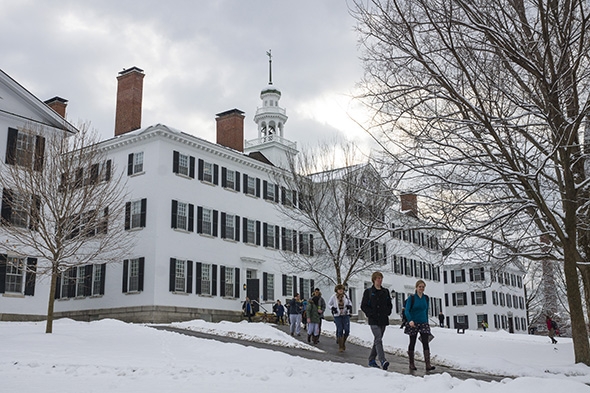
As faculty work to develop the first of six interdisciplinary teams—Dartmouth’s Cluster Initiative—Provost Carolyn Dever has put out a call for proposals in what will be the second round of faculty groups working across disciplines to create new knowledge and new ways of learning.
The College’s Cluster Initiative is a pillar of President Phil Hanlon’s vision for Dartmouth and is among the programs supported in part by recent major gifts. Additional fundraising efforts are under way to support the initiatives.
These collaborative faculty teams from across the Arts and Sciences and the professional schools will be organized around solving complex issues of global importance and are part of President Hanlon’s plan to increase the size and diversity of the faculty.
The request for a second round of proposals was sent to faculty members on Thursday, with proposals to be sent to Dever by Feb. 16. Final decisions on the next group of clusters are planned for the end of April.
“I hope and fully expect that our second call for proposals will result in an equally robust group of proposals for consideration. I urge faculty from all disciplines, interdisciplinary areas, and methodological approaches to consider developing a faculty cluster proposal,” Dever wrote in her message to faculty.
Clusters currently in the planning stages are:
- The William H. Neukom Academic Cluster in Computational Science, funds for which are part of a $10 million gift from Trustee Emeritus Bill Neukom ’64 that was announced last spring. The Neukom Cluster will include three new faculty members in diverse fields who use advanced computational techniques in their work. One of the new professorships will be a distinguished chair named for Thomas Kurtz, the pioneering Dartmouth mathematics professor and computer scientist who, along with former President John Kemeny, created the BASIC computer language 50 years ago. The gift also will fund a postdoctoral fellow in computational science. A search is under way for the inaugural Kurtz chair.
- Breaking the Neural Code: Neural decoding involves work by cognitive neuroscientists, neurophysiologists, mathematicians, computer scientists, and engineers, among others. This cluster will capitalize on Dartmouth’s strengths in these fields and foster interdisciplinary collaboration to make the College a world leader in computational neuroscience. The cluster will hire three faculty in Arts and Sciences, Thayer School of Engineering, and the Geisel School of Medicine: an experimental computational neuroscientist, a computational scientist with a focus on neural decoding, and a neurophysiologist with a focus on brain-computer interface.
- Ice, Climate, and Energy: This cluster will focus on issues related to the Arctic. It builds on and expands programs in this area at Thayer, the Department of Earth Sciences, and the Institute of Arctic Studies at the John Sloan Dickey Center for International Understanding by hiring three new faculty who will work across disciplines. Two of the faculty members will advance understanding of sea ice and its impacts on other aspects of the Earth, including atmosphere, ocean plant and animal life, and human activities, while a third faculty member will develop computational approaches to complex problems related to high-latitude climate and the energy sector.The cluster will also fund an annual symposium on Ice, Climate, and Energy, a post-doctoral fellowship, and several undergraduates who will work with a faculty member.
- Health Care Delivery Science: With the addition of seven new faculty members to be recruited over three years, Dartmouth will build on its current strengths to establish leadership in three areas of scholarship—health behaviors and patient engagement; improving care delivery and implementation science; and tracking medicine through measurement and reporting. While focused on research, this initiative will create major new educational opportunities for Arts and Science students; advanced-degree students in health care delivery science, business, engineering; and medical students, residents, and clinicians in health care.
- The Economics and Politics of Globalization: With widely recognized strengths in economics, business, and international relations, a significant expansion of faculty clustered in this area will enhance Dartmouth’s ability to have faculty, students, and staff at the forefront of innovative scholarship, teaching, and practice. This cluster will develop evidence-based leadership to shape the forces of globalization for the better.
- Sustainability Science and Governance: Building on strengths in fields such as environmental studies, ecology, and energy technology, this cluster will create three faculty positions in the fields of agro-ecology and food systems, global change biology, and energy analysis and policy to complement existing activities and resources while giving rise to new synergies. The cluster will foster interdisciplinary research and education, linking theory to practice concerning these cross-cutting challenges.
Successful proposals will draw on existing research strengths at the College; have a likelihood of making a major impact on the understanding of complex problems; anticipate new areas of research at Dartmouth and beyond; improve faculty diversity; and establish the basis for new courses of study, among other requirements. Dever says she anticipates that after this second round, there will at least one more call for cluster proposals.